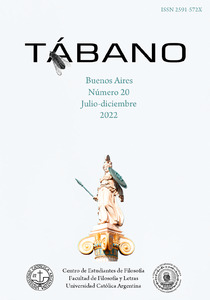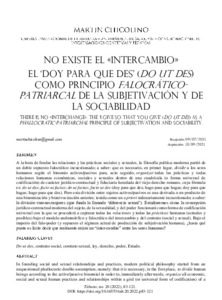Por favor, use este identificador para citar o enlazar este ítem:
https://repositorio.uca.edu.ar/handle/123456789/14554| Título: | No existe el «intercambio». El ‘doy para que des’ (do ut des) como principio falocrático-patriarcal de la subjetivación y de la sociabilidad There is no «interchange». The ‘I give so that you give’ (do ut des) as a phallocratic-patriarchal principle of subjectivation and sociability |
Autor: | Chicolino, Martín | Palabras clave: | RELACIONES SOCIALES; RELACIONES SEXUALES; PATRIARCADO; GENERO; FILOSOFIA MODERNA; CONTRATO SOCIAL; DERECHO; PODER; ESTADO | Fecha de publicación: | 2022 | Editorial: | Pontificia Universidad Católica Argentina. Facultad de Filosofía y Letras. Centro de Estudiantes de Filosofía | Cita: | Chicolino, M. No existe el «intercambio». El ‘doy para que des’ (do ut des) como principio falocrático-patriarcal de la subjetivación y de la sociabilidad [en línea]. Tábano. 2022, 20 doi:10.46553/tab.20.2022.p94-132 Disponible en: https://repositorio.uca.edu.ar/handle/123456789/14554 | Resumen: | Resumen: A la hora de fundar las relaciones y las prácticas sociales y sexuales, la filosofía política moderna partió de
un doble supuesto falocrático incuestionado; a saber: que es necesario, en primer lugar, dividir a los seres
humanos según el binomio activos/pasivos para, acto seguido, organizar todas las prácticas y todas
relaciones humanas económicas, sociales y sexuales dentro de una cuadrícula (o forma universal de
codificación) de carácter jurídico-contractual y fiduciaria heredada del viejo derecho romano, cuya fórmula
es: do ut des; facio ut facias; do ut facias; facio ut des (doy para que des; hago para que hagas; doy para que
hagas; hago para que des). Pero esta división entre sujetos activos/pasivos es una derivada o un producto de
una binomización y biunivocización anterior, tenida como un a priori milenariamente incuestionado; a saber:
la división varones/mujeres (que funda la llamada ‘diferencia sexual’). Estudiaremos cómo la concepción
jurídico-contractual moderna del sujeto, de la sexualidad, y del poder funcionará como forma de codificación
universal con la que se procederá a capturar todas las relaciones y todas las prácticas humanas (actuales y
posibles) bajo el modelo andromórfico y falocrático del intercambio y del contrato (social y sexual). Bajo el
imperio del falo-poder (y supuesto el régimen actual de producción de subjetivación humana), ¿hasta qué
punto es lícito decir que realmente existe un “inter-cambio” entre los seres humanos? Abstract: In founding social and sexual relationships and practices, modern political philosophy started from an unquestioned phallocratic double assumption; namely: that it is necessary, in the first place, to divide human beings according to the active/passive binomial in order to, immediately afterwards, organize all economic, social and sexual human practices and relationships within a grid (or universal form of codification) of a juridical-contractual and fiduciary nature inherited from the old Roman law, whose formula is: do ut des; facio ut facias; do ut facias; facio ut des (I give so that you give; I do so that you do; I give so that you do; I do so that you give). But this division between active/passive subjects is a derivative or a product of a previous binomization and biunivocalization, held as a millennially unquestioned a priori; namely: the male/female division (which founds the so-called ‘sexual difference’). We will study how the modern legalcontractual conception of the subject, of sexuality, and of power will function as a form of universal codification with which all relationships and all human practices (current and possible) will be captured under the andromorphic and phallocratic model of exchange and contract (social and sexual). Under the rule of phallo-power (and assuming the current regime of production of human subjectivation), to what extent is it legitimate to say that there really is an “interchange” between human beings? |
URI: | https://repositorio.uca.edu.ar/handle/123456789/14554 | ISSN: | 2591-572X | Disciplina: | FILOSOFIA | DOI: | 10.46553/tab.20.2022.p83-121 | Derechos: | Acceso abierto | Fuente: | Tábano. 2022, 20 |
| Aparece en las colecciones: | TAB - 2022 nro. 20 |
Ficheros en este ítem:
| Fichero | Descripción | Tamaño | Formato | |
|---|---|---|---|---|
| cover.png | 671,61 kB | image/png |  Visualizar/Abrir | |
| no-existe-intercambio.pdf | 689,88 kB | Adobe PDF |  Visualizar/Abrir |
Visualizaciones de página(s)
82
comprobado en 27-abr-2024
Descarga(s)
111
comprobado en 27-abr-2024
Google ScholarTM
Ver en Google Scholar
Altmetric
Altmetric
Este ítem está sujeto a una Licencia Creative Commons

